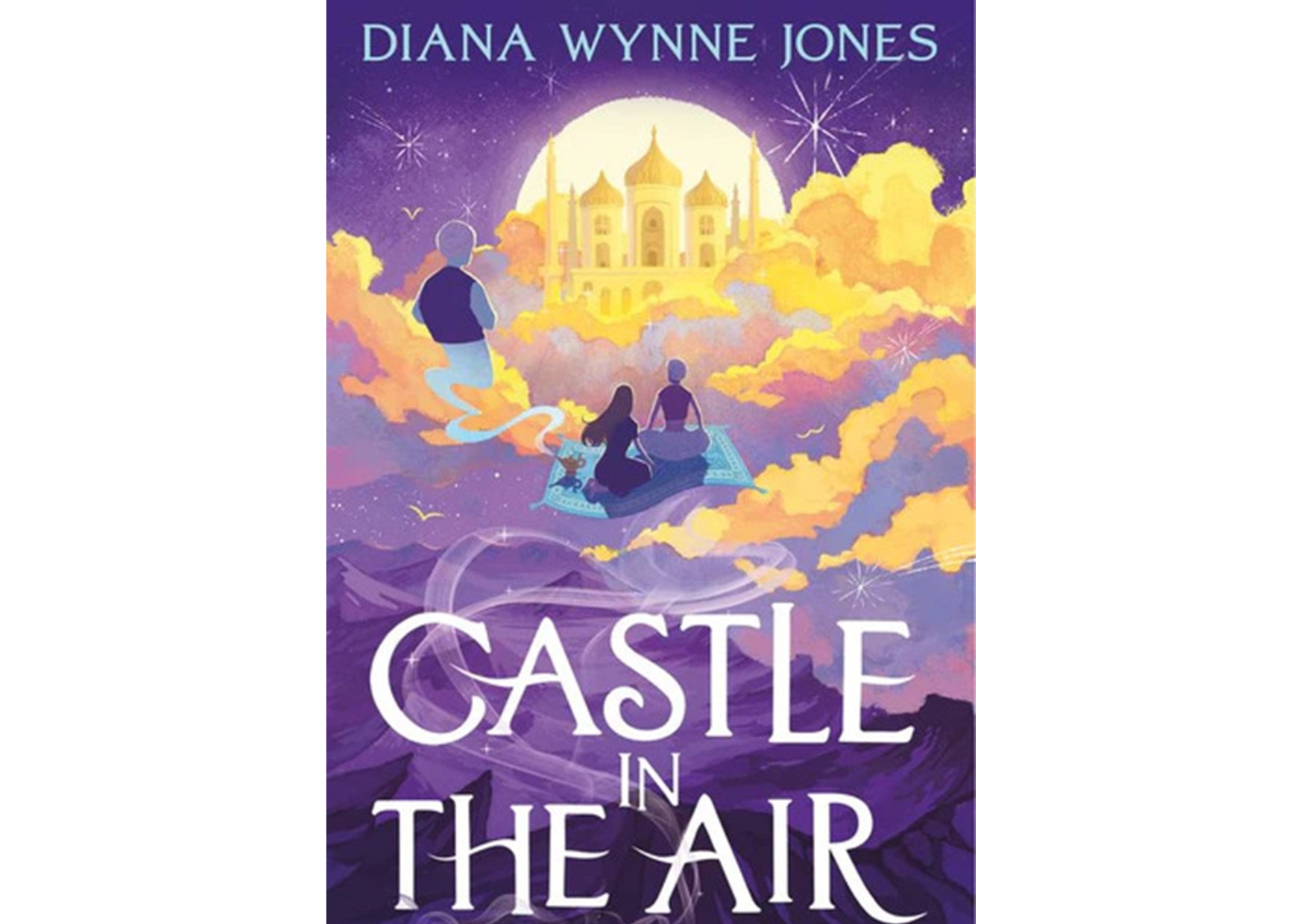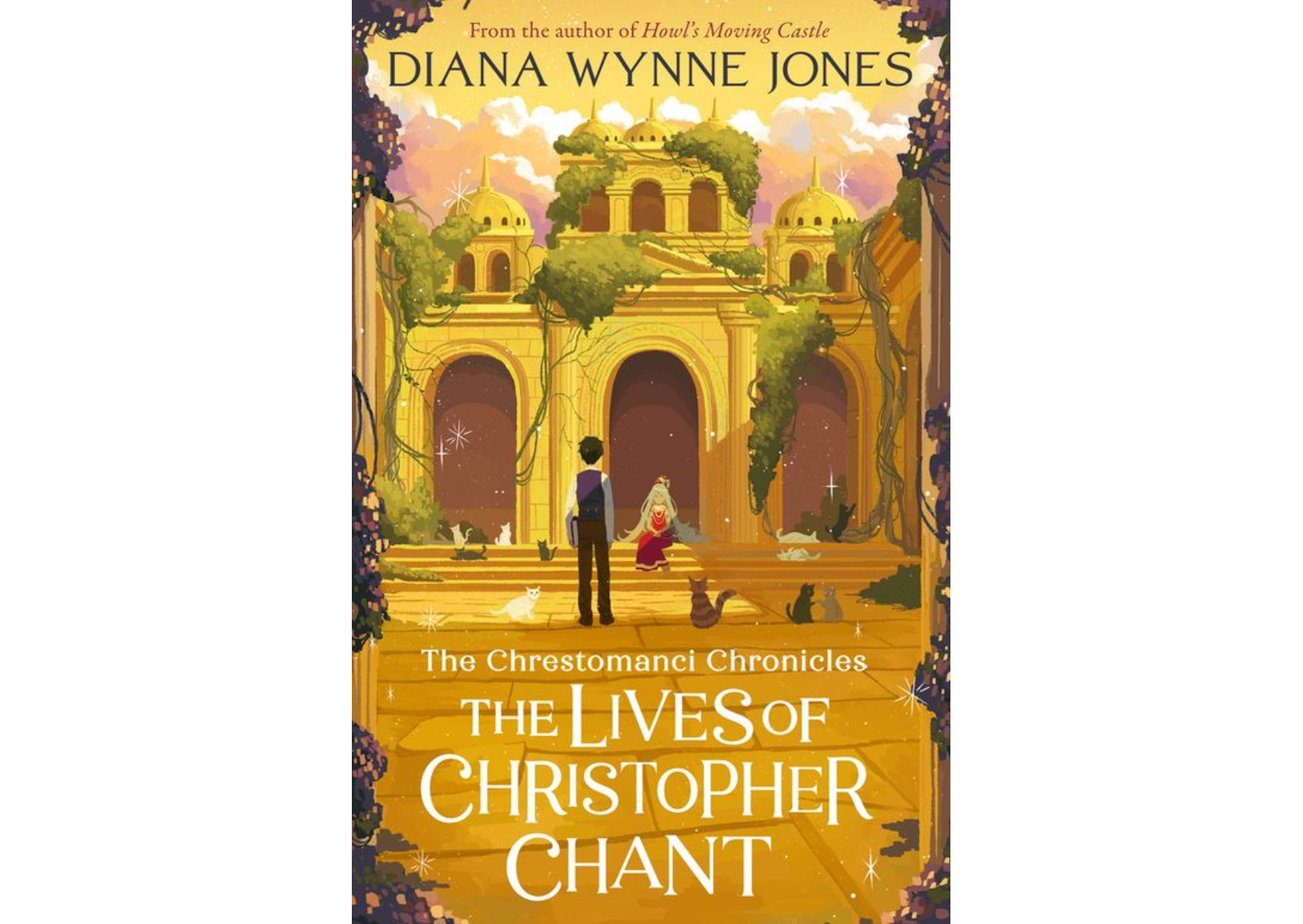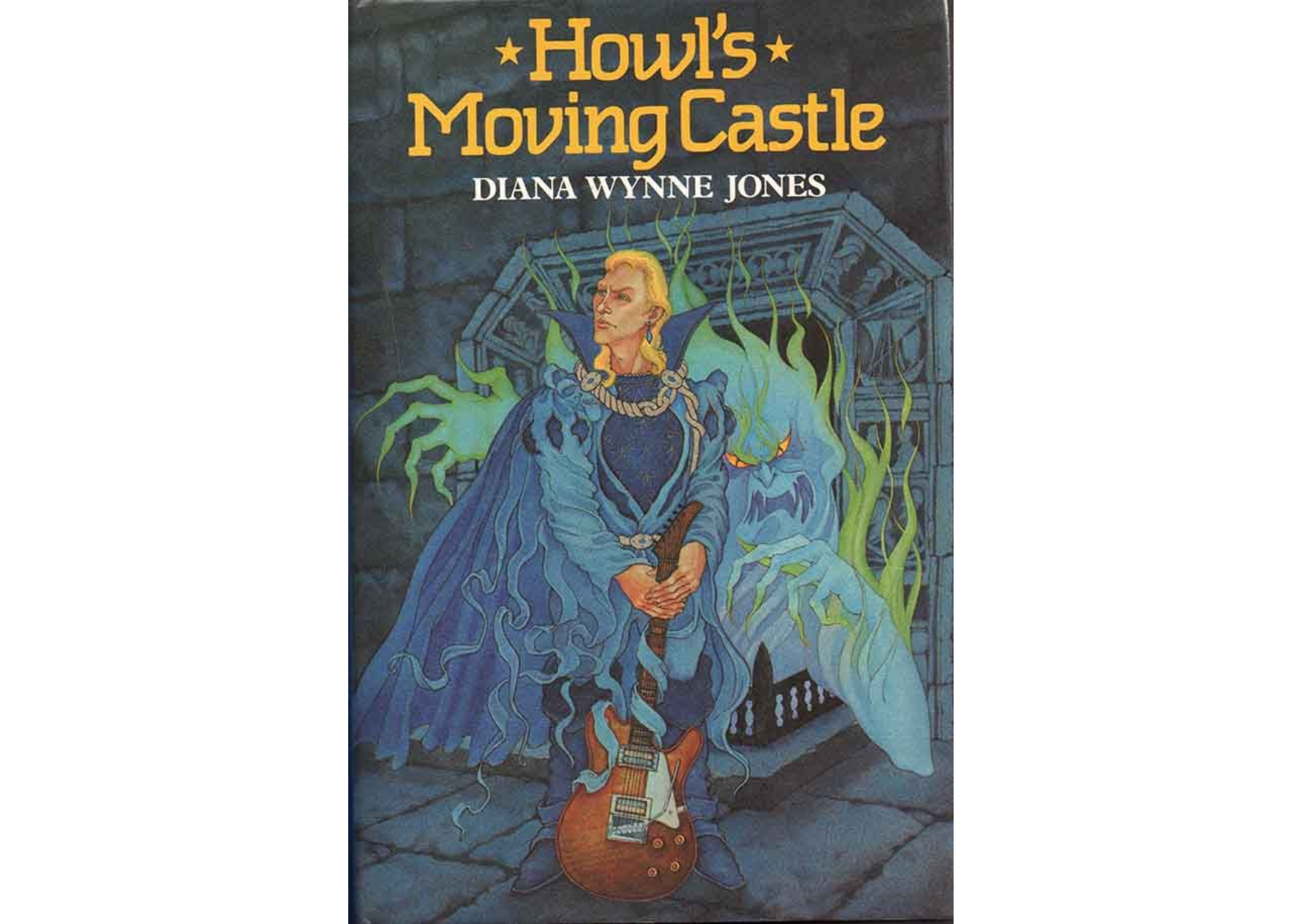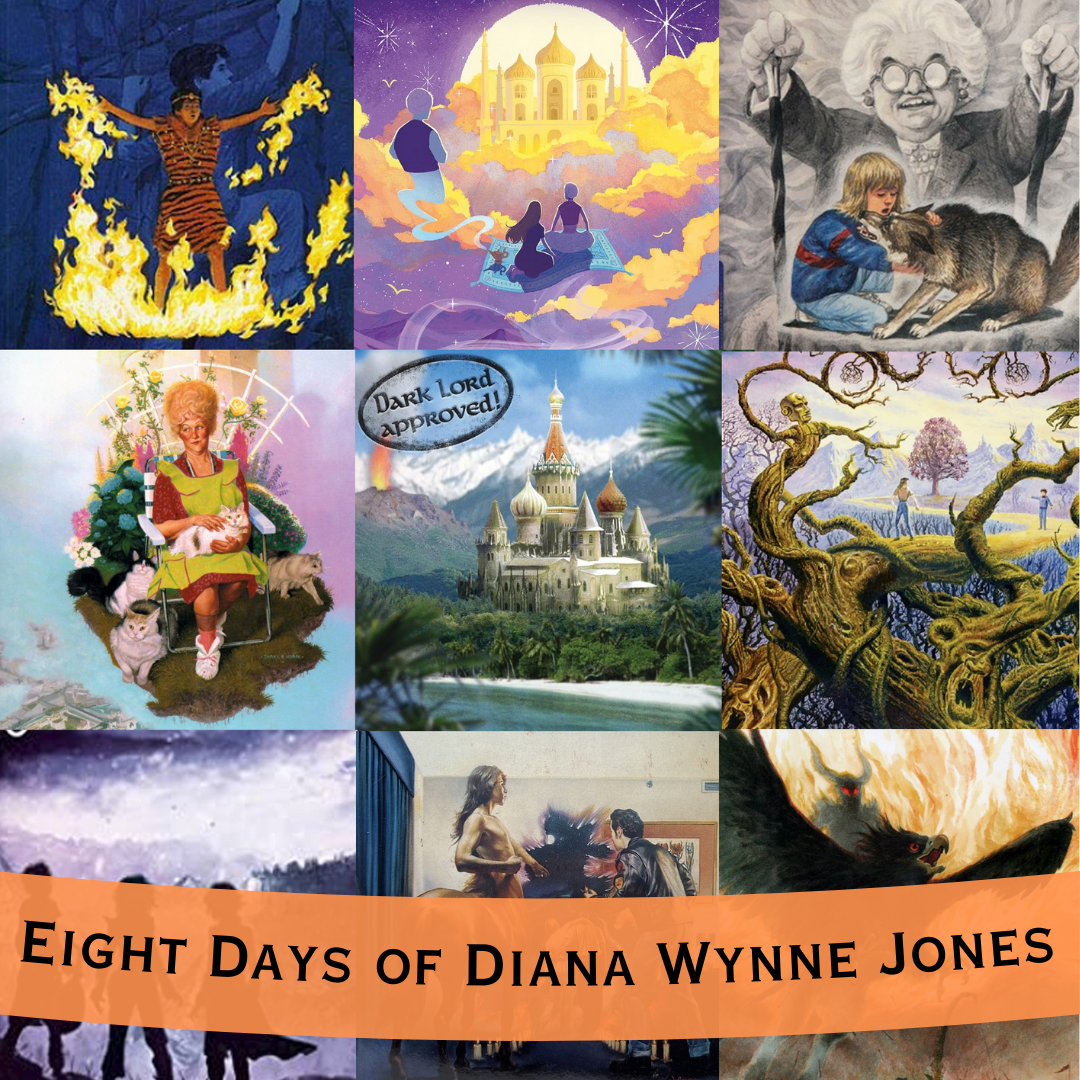The works of Diana Wynne Jones, in order, one decade at a time, with Emily Tesh and Rebecca Fraimow
Eight Days of Diana Wynne Jones is a DWJ readalong podcast, winner of the 2025 Hugo Award for Best Fancast. You can find us on Zencastr, Apple Podcasts, Spotify, and YouTube.
Follow us on Bluesky or tumblr, or email us at eightdaysofdiana AT gmail DOT com.

S3 E2: Castle in the Air
‘That djinn has taken liberties with a person's castle,’ Sophie said. 'Unless I'm entirely turned around, this used to be our bathroom.'
Richard Burton's Arabian Nights and Edward Said's Orientalism, fairy tale and retail, big dreams, big crimes, and Diana Wynne Jones' empire of the imagination.

S3 E1: The Lives of Christopher Chant
Nobody should be losing lives at this rate. What is wrong, Christopher?
In our first episode of Season Three, the brilliant Iona Datt Sharma joins us for a discussion of bureaucracy, cricket boys, Burton and Kipling, and the limitations of escape into fantasy.

S2 Bonus Episode 3: Listener Q&A
The first time round most of the catching-up you do is retrospective. The second time round you see it happening.
In our final S2 bonus episode, we do a terrible job of not looking ahead to Hexwood as we work our way through a wonderful pile of letters to discuss class, adulthood, lying DWJ fathers, the many (more) layers of Fire and Hemlock, and the real meaning of "The Master."

S2 Bonus Episode 2: DWJ Short Stories of the 70s and 80s
"She has tremendous talent, of course, or she couldn’t do it at all, but I do sometimes feel that she—well—she repeats herself. Put it like this: I think maybe Carol doesn't give herself a chance to be herself any more than she gives us."
Endless questions, out-of-control characters, silly adults and weird bad dads: this week we're discussing the playground of ideas that makes up DWJ's short fiction of the seventies and eighties.
Titles discussed include "Carruthers" (1972), "Auntie Bea's Day Out" (1978), "The Fluffy Pink Toadstool" (1979), "The Sage of Theare" (1982), "Warlock at the Wheel" (1984), "Dragon Reserve, Home Eight" (1984), "No One" (1984), "The Plague of Peacocks" (1984), "Carol Oneir's Hundredth Dream" (1986), "Enna Hittims" (1987), "The Fat Wizard" (1987), "The Green Stone," (1988), and "The Master" (1989).

S2 Bonus Episode 1: With Farah Mendlesohn
The thing we must notice is frequently identified by what is not described or told or explained.
In our first Season Two bonus episode, Farah Mendlesohn -- who literally wrote the book on Diana Wynne Jones -- joins us to bring a critic and historian's eye to the first two decades of DWJ's career.

S2 E8: A Tale of Time City
Twenty Century refugee equipment. Case is open to show clothing and protective mask.
A tale of one or two cities, three or four Vivians, four to fourteen badly translated old women, and at least two hundred thousand dollars' worth of butter-pie.

S2 E7: Howl’s Moving Castle
Her mind was such a blank that for a second, it actually seemed to her that Howl had no faults at all. How stupid!
The fantastic Freya Marske joins us for a discussion of John Donne, fairy tales, unmusical Welshmen, and Diana Wynne Jones' first truly romantic novel.

S2 E6: Fire and Hemlock
She realized he had sat down on purpose near the door, and she knew, perhaps without quite understanding it, that if she ran away, it would mean he had to go back into the funeral again. She was his excuse for coming out of it, so she stayed.
A man who wants to craft himself a Janet, a girl who wants to make herself a hero, and the full three hours we spend working through the powerful fictions and terrible truths that result.
[NB: themes of grooming and child abuse are woven pretty inextricably through our conversation this episode. Also, it is Three Hours Long.]

S2 E5: Archer’s Goon
I hate Mum, I hate Dad, I hate Howard and the Goon.
Big brothers and bigger brothers, good words and bad infrastructure, the power of being a megalomaniac evil wizard, and the power of having parents that you actually trust.

S2 E4: Witch Week
"He was fairly sure it made you wicked too, to be kissed by a witch."
The horrors of the British boarding school, the things you learn about yourself in the men's locker room, and what the Chrestomanci series is really about (it's Chrestomanci.)

S2 E3: The Homeward Bounders
"There are no rules, only principles and natural laws."
This week we're joined by the brilliant Adrian Tchaikovsky to discuss heroes and NPCs, gods and demons and sacrificial victory, and the worst fate that can befall anyone: endless nonconsensual cricket.

S2 E2: The Time of the Ghost
"People write stories pretending you can alter the past, but it can't be done. All you can do to the past is remember it wrong or interpret it differently."
The horrors of the past, the traps of the future, and being cursed, with sisters.
[NB: this is another one that deals more directly with abuse and suicidality in several forms]
For more on Time of the Ghost, check out Em's Reactor article on Making the Metaphor Literal: Fantastic Reality in The Time of the Ghost by Diana Wynne Jones.

S2 E1: The Magicians of Caprona
Tonino wondered how he could laugh like that at something so horrible until he remembered that he had stood himself a score of times and laughed himself sick at just the same thing.
Two households both alike in comedy, in fair Caprona where we lay our first episode for Eight Days of Diana Wynne Jones, Season Two: the Eighties.

Bonus Episode: Season One Q&A
And as I fixed upon the down-turned face
That pointed scrutiny with which we challenge
The first-met stranger in the waning dusk
I caught the sudden look of some dead master...
Dalemark conspiracy theories, double selves, and conversations with the past: a look back at DWJ in the seventies.

S1 E8: The Spellcoats
The story is largely self explanatory, but certain obscurities in the text have been amended to avoid confusing the reader.
The power of the land, the return of the king, and the magic of finding meaning in a text.

S1 E7: Drowned Ammet
Mitt was not sure he knew what a free soul was – it never occurred to him that his mother had no idea either – but he thought it was a splendid thing to be.
Revolution, righteous anger, gods and prophecy and the most common name in Holand.

S1 E6: Charmed Life
"God bless her dear little sugar-coated shining soul."
The English class system, American science fiction, and the Problem of Gwendolen.
(Please pardon our audio this week as we dealt with travel and microphone issues!)

S1 E5: Power of Three
“But why should a few people suffer a lot,” he said, “so that a lot of people shouldn't suffer at all?”
Thwarted tragedy, the useful myth of Christianity, and sad teen trios that transcend racism.

S1 E4: Cart and Cwidder
I sing for Osfameron; I move in more than one world.
The power of art, the divided self, and Walemark.

S1 E3: Dogsbody
Soon only Sirius was scratching and tearing at the dark, and he only kept on because he had a dim notion that anything was better than cold nothingness.
Politics, parenting, sex and death.
[NB: We had a special very small guest on this one, so if you hear the occasional kick or wail against the infinite difficulty of being alive, just remember: it's thematic!]
